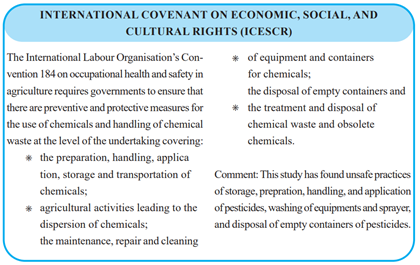

17th August 2022 (9 Topics)
Context
According to a recent report, safety of agricultural produce and environmental contamination is at risk due to the rampant use of four highly hazardous pesticides (HHP).
About
What pesticides are getting overused?
- Chlorpyrifos
- Fipronil
- Atrazine
- Paraquat
|
The Report
|
Highly Hazardous Pesticides (HHP):
Definition as per International Code of Conduct on Pesticide Management, adopted by FAO and WHO in 2013: "Highly Hazardous Pesticides means pesticides that are acknowledged to present particularly high levels of acute or chronic hazards to health or environment according to internationally accepted classification systems such as WHO or GHS or their listing in relevant binding international agreements or conventions. In addition, pesticides that appear to cause severe or irreversible harm to health or the environment under conditions of use in a country may be considered to be and treated as highly hazardous".
Key findings:
- The HHPs are approved for use in the country for only specific crop-pest combinations.
- However, they are being used for several food and non-food crops without approval.
- Chlorpyrifos is approved for 18 crops in India, while the study found it was used for 23 crops.
- Fipronil is approved for nine crops but was used in fields for 27 crops.
- Similarly, atrazine and paraquat dichloride are approved for one and 11 crops, respectively, but field uses were noted for 19 and 23 crops, respectively.
- About 20 per cent farmers and 44 per cent workers who participated in the study reported exposure and poor health.
- About 40% of the total registered pesticides in India are categorised as highly hazardous owing to their potential to cause health and environmental damage.
|
About PAN India
|



